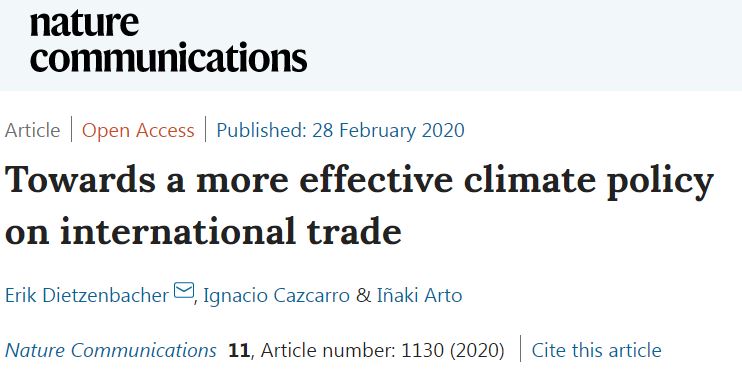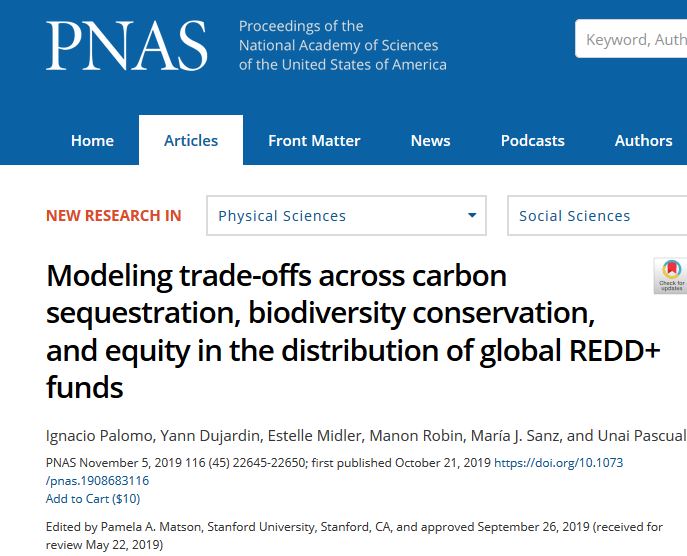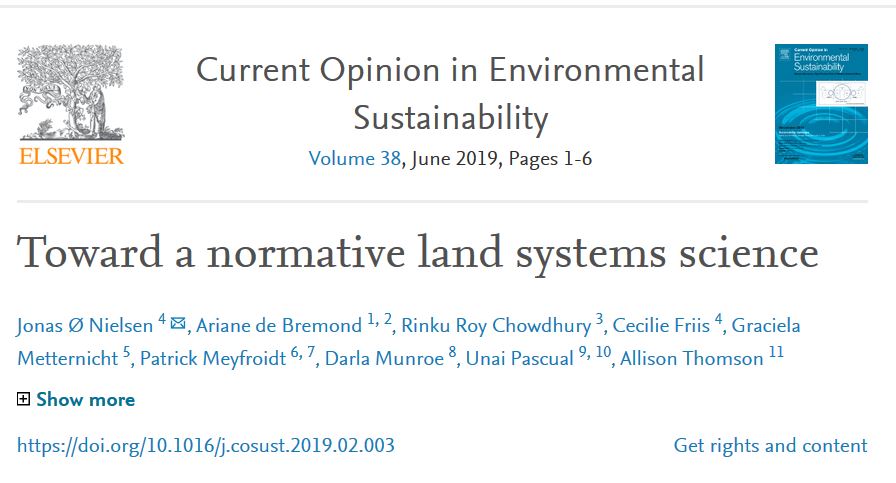Journal Articles
25 martxoa, 2020
Published by BC3Research Iratxe Rubio at 25 martxoa, 2020
There is broad evidence of climate change causing shifts in fish distribution worldwide, but less is known about the response of fisheries to these changes. Responses to climate‐driven shifts in a fishery may be constrained by existing management or institutional arrangements and technological settings. In order to understand how fisheries are responding to ocean warming, we investigate purse seine fleets targeting tropical tunas in the east Atlantic Ocean using effort and sea surface temperature anomaly (SSTA) data from 1991 to 2017.
20 martxoa, 2020
Published by BC3Research Asun Rodríguez at 20 martxoa, 2020
A pesar del rápido crecimiento del uso de la restauración, esta no siempre genera una respuesta a corto plazo en los ecosistemas que garantice la recuperación de su estructura, funciones y servicios. Hasta ahora, la mayoría de los estudios que han evaluado la recuperación de ecosistemas utilizaban métricas que ignoran la complejidad necesaria para estructurar las comunidades de organismos que conforman los ecosistemas.
2 martxoa, 2020
Published by BC3Research Iñaki Arto at 2 martxoa, 2020
CO2 isurien erantzukizuna ekoizleen eta kontsumitzaileen artean esleitzea gai eztabaidagarria da klima aldaketaren politikan eta ikerketan. Bi kontabilitate metodo nagusi erabiltzen dira literaturan, herrialdeek emisio globalei egiten dieten ekarpena zehazteko. Ekoizpenean oinarritutako kontabilitateak (PBA) herrialde bateko industriek eta etxeek atmosferara askatutako CO2 kopurua neurtzen du. Kontsumoan oinarritutako kontabilitateak (CBA) herrialdearen amaierako produktuen kontsumoari egozten dizkio emisioak. PBA emisioak birbanatzen ditu CBAk, eta beste herrialde bateko emisioak jatorrizko herrialdearen kontsumorako beharrezkoak direla uste du. Bi kontabilitate-esparru horiek egungo CO2 isurien erantzukizuna esleitzeko erabiltzen dira. Ekoizpenaren ardura emisioak zuzenean sortzen dituzten herrialdeei zuzentzen zaie. Kontsumitzailearen erantzukizuna azken batean presioa bultzatzen duten herrialdeei zuzentzen zaie.
11 azaroa, 2019
Published by BC3Research Ignacio Palomo Maria Jose Sanz Unai Pascual at 11 azaroa, 2019
The program on Reducing Emissions from Deforestation and Forest Degradation (REDD+) is one of the major attempts to tackle climate change mitigation in developing countries. REDD+ seeks to provide result-based incentives to promote emission reductions and increase carbon sinks in forest land while promoting other cobenefits, such as the conservation of biodiversity.
22 urria, 2019
Published by BC3Research Maria Jose Sanz at 22 urria, 2019
The Paris Agreement introduced an ambitious goal of limiting warming to 1.5 °C above pre-industrial levels. Here we combine a review of modelled pathways and literature on mitigation strategies, and develop a land-sector roadmap of priority measures and regions that can help to achieve the 1.5 °C temperature goal. Transforming the land sector and deploying measures in agriculture, forestry, wetlands and bioenergy could feasibly and sustainably contribute about 30%, or 15 billion tonnes of carbon dioxide equivalent (GtCO2e) per year, of the global mitigation needed in 2050 to deliver on the 1.5 °C target, but it will require substantially more effort than the 2 °C target
18 iraila, 2019
Published by BC3Research Xaquín García Mikel González-Eguino at 18 iraila, 2019
Environmental externalities call for the use of environmental taxes to get prices right and thereby reduce environmental pressures. To date, however, the Spanish government makes only limited use of environmental taxes. One major reason for the policy reluctance are concerns on the regressive impacts of environmental taxes. We argue that policy can hedge against these concerns by means of revenue recycling. More specifically, we assess the impacts of a green tax reform where additional revenues are redistributed lump-sum to Spanish households on an equal-per-capita basis. Based on quantitative evidence from coupled microsimulation and computable equilibrium analyses we find that such a green tax reform leads to a substantial reduction in harmful emissions while having a progressive impact.
7 abuztua, 2019
Published by BC3Research Silvestre Garcia Jorge Curiel Aline Chiabai at 7 abuztua, 2019
There is increased interest in the role of trees to reduce air pollution and thereby improve human health and well-being. This study determined the removal of air pollutants by dry deposition of trees across the Basque Country and estimated its annual economic value. A model that calculates the hourly dry deposition of NO2, O3, SO2, CO and PM10 on trees at a 1 km x 1 km resolution at a regional scale was developed.
5 apirila, 2019
Published by BC3Research Unai Pascual at 5 apirila, 2019
Science should provide solutions for societal transformations toward sustainability in the face of global environmental change. Land system science, as a systemic science focused on complex socio-ecological interactions around land use and associated trade-offs and synergies, is well placed to contribute to this agenda.
3 apirila, 2019
Published by BC3Research Stefano Balbi Ferdinando Villa at 3 apirila, 2019
Enhancing the governance of social-ecological systems for more equitable and sustainable development is hindered by inadequate knowledge about how different social groups and communities rely on natural resources. We used openly accessible national survey data to develop a metric of overall dependence on natural resources. These data contain information about households' sources of water, energy, building materials and food.
2 apirila, 2019
Published by BC3Research Jorge Curiel at 2 apirila, 2019
Woody encroachment is a widespread phenomenon resulting from the abandonment of mountain agricultural and pastoral practices during the last century. As a result, forests have expanded, increasing biomass and necromass carbon (C) pools. However, the impact on soil organic carbon (SOC) is less clear. The main aim of this study was to investigate the effect of woody encroachment on SOC stocks and ecosystem C pools in six chronosequences located along the Italian peninsula, three in the Alps and three in the Apennines.










